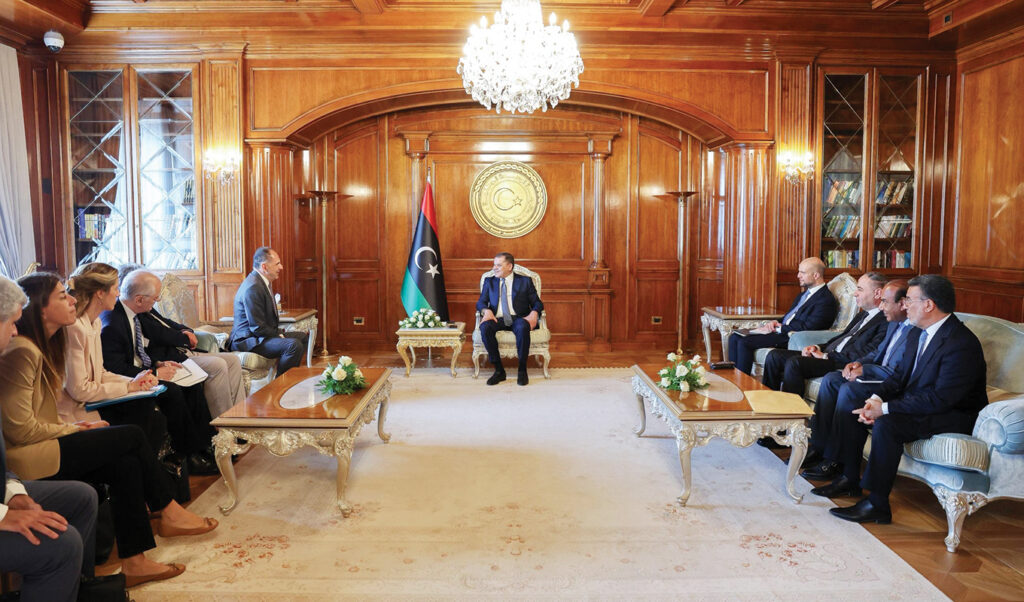Libya is evolving into a persistent headache for Greek foreign policy. Turkish penetration in the divided North African country is intensifying rather than diminishing, with neighboring states bearing the consequences. Unlike Italy, for example, which is launching energy investments and a military cooperation plan with Libya, Greece continuously finds itself on the receiving end of problematic Libyan diplomacy. Foreign Minister Giorgos Gerapetritis traveled to Benghazi and (deliberately) two weeks later to Tripoli, aiming to re-engage with the Libyans. Whether this was done in a timely manner or with delay is left to individual judgment, however the pressure Crete has been receiving lately from migration flows and Libya’s recent moves at the UN with the Turkey-Libya memorandum as a “compass” lead to one conclusion: There was no time to waste.
Behind the scenes of Gerapetritis’ visit to Libya
According to information from “P”, the Greek minister’s contacts in (pro-Turkish) Tripoli were conducted in an unexpectedly good climate, which however was overturned a few hours later (early Thursday morning). Diplomatic sources report that regarding migration, they agreed that there should be understanding for border control of land and sea boundaries, with the Libyan side requesting Greece’s assistance both on a bilateral level and within the framework of the EU and the UN Security Council. Regarding the tender announcement for hydrocarbon exploration research in two maritime blocks south of Crete, G. Gerapetritis emphasized that Greece exercises its sovereign rights based on International Law and does not act against third parties, thus attempting to “reassure” Libya. A few hours later, in fact, Environment and Energy Minister Stavros Papastavrou had a telephone communication with Chevron’s Vice President of Global Exploration, Liz Schwarze, with whom he discussed the next steps and some indicative timelines regarding Chevron’s exploration prospects.
Athens responded through diplomatic sources, emphasizing that these actions do not produce legal interests and that they are unilateral pious wishes
Libya: Gerapetritis’ message
Mr. Gerapetritis traveled to Tripoli with a message: that a unified, strong and self-sufficient Libya, in good cooperation with Greece, can constitute a guarantee of peace and security in the broader region. Also, the head of Greek diplomacy conveyed in his contacts with the President of Libya’s Presidential Council, Mohammed Menfi, with the Prime Minister of Libya’s (transitional) Government of National Unity (GNU), Abdul Hamid Dbeibah, as well as with the acting Foreign Minister, Taher Al Baour, that there are no problems that cannot be solved through dialogue. Waving an olive branch, therefore, Mr. Gerapetritis also threw a “bait” to the Libyans. In their private discussions, he told them that Greece, being a member state of the European Union, can become Libya’s voice in Europe and the world. Well-informed sources told the author that this was very appealing to the Libyan side, which, as is known, has recently been engaging in hard bargaining with Europeans, asking them for money to rebuild the country destroyed by civil war. However, it is considered difficult to utopian to tie Libya to the European chariot and detach it from Turkey. It’s not just the illegal Turkey-Libya memorandum that connects them. Turkey has two bases in Libya (Al Watiya and Misrata), 2,200 mercenaries and dozens of MIT agents, who are omnipresent.
Libya’s double-speak
Mr. Gerapetritis’ visit was preceded by an extremely provocative move by Libya, indicative of the diplomatic double-speak that characterizes it. Tripoli submitted a verbal note to the UN, directly challenging the median line that Greece has defined, based on which the blocks have been drawn, not only west, but also south of Crete, which were offered for hydrocarbon research licensing. Moreover, in the maps attached to Tripoli’s verbal note, the demarcation line that Libya adopts as a continuation of the Turkey-Libya “memorandum” is depicted, which essentially makes the Greek EEZ south of Crete disappear. According to Greek diplomatic sources, this text “does not add anything to the already formulated argumentation,” while an official Greek response to the UN is also being prepared. In the early hours of Thursday, however, another Libyan provocation with a Turkish “flavor” emerged. Libya submitted a new map to the UN, with its continental shelf reaching up to Crete, applying the Turkey-Libya memorandum and the logic of the “Blue Homeland.” It characterizes as illegal and invalid Greece’s historic EEZ agreements with Egypt and Italy and the planning for maritime parks, while also demanding cancellation of tenders and research south and west of Crete. In other words, using Libya as a vehicle, Turkey is trying to squeeze Greece in areas where it has no say and create a stranglehold in the entire maritime area of our country, where islands would be limited to 6-mile territorial waters. Athens responded through diplomatic sources emphasizing that these actions do not produce legal interests and that they are unilateral pious wishes, showing that there is probably no real will for dialogue based on International Law.
Published in Parapolitika newspaper




